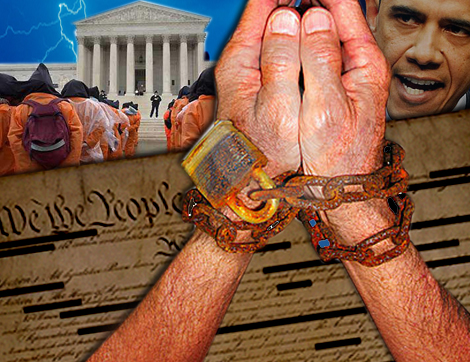
• Journalists filed lawsuit to challenge warfare state
By Mark Anderson
The Second Circuit Court of Appeals on July 17 tossed out a lawsuit that challenged Section 1021 of the lengthy 2012 National Defense Authorization Act (NDAA), which plaintiffs said could be used to arrest Americans merely suspected of aiding terrorists and detain them indefinitely under the laws of war.
Former New York Times reporter and lead plaintiff Chris Hedges, and other journalists and activists, brought this case, saying this particular section of the 2012 NDAA gives the president unconstitutional authority to lock up anyone simply suspected of aiding or associating with terrorists and then throw away the key.
Hedges—who, as a reporter, sometimes contacts those the government might define as terrorists—expressed concern that he and any other journalists, while doing their work, may be targeted as terrorist-associates.
In a 60-page ruling, a three judge panel from the Court found that the plaintiffs “lacked legal status to mount a challenge to the law because it ‘says nothing at all about the President’s authority to detain American citizens,’ and that two non-citizens who were also plaintiffs had failed to show that they were actually threatened with detention.”
Hedges’s legal challenge against the NDAA, while it focused on the previous fiscal year’s NDAA, serves to get Americans’ attention and reveal the serpentine ways that a government constantly at war may expand its dragnet. But those concerned about maintaining freedom from arbitrary imprisonment should note that the true foundation of this nation’s current status of ongoing warfare—and war historically is the basis for cracking down on civil liberties, including detention of war opponents—is the 2001 Authorization to Use Military Force (AUMF) feverishly passed by Congress right after the 9-11 attacks.
With Osama bin Laden—the so-called al Qaeda “mastermind” who supposedly orchestrated the 9-11 attacks which inspired the AUMF—now dead, and with the United States conducting talks with the Taliban, the AUMF should not be allowed to be in effect forever. “Sunsetting” the AUMF could presage a relaxation of hostilities and safeguard civil liberties. Notably, Representative Adam Schiff (D-Calif.), a member of the House Permanent Select Committee on Intelligence, has introduced H.R. 2324 to end the AUMF on December 31, 2014—a date chosen to coincide with the assumed withdrawal of American combat troops from Afghanistan.
In related developments, Representative Justin Amash (R-Mich.), while his recent bipartisan amendment to significantly limit the National Security Agency’s spy programs failed, is still seen, even by the generally pro-warfare state Washington Post, as a force to reckon with over the long haul. Amash—while citizen distrust of the NSA is growing—apparently won’t back down and needs support in challenging the NSA’s all-encompassing spying against Americans, which can gather the very information that the U.S. government could use to accuse everyday Americans of associating with terrorists.
Mark Anderson is AFP’s roving reporter. Listen to Mark’s weekly radio show on the AMERICAN FREE PRESS RADIO NETWORK.

